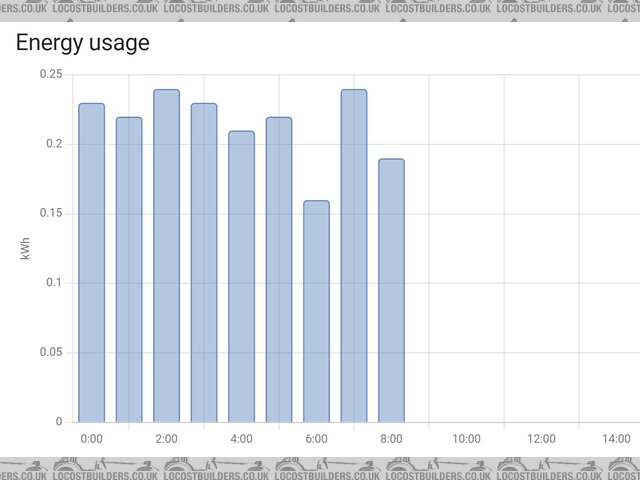Dehumidifier
Central heating boiler (60W when active)
3x Network switches
1x Mini PC
2x CCTV Camera
1x modem
1x Router


Baseload

Just going to bed and I noticed the electricity meter.
What is your base load? The amount you use when nothing it's actively being used?
When I turned off the computer it was nearly 400w, watching it now it's dropped to 250 to 300w. 250 send high, 400 ridiculous butt I don't
know if that's just me being a grumpy old man.
I've no idea what is eating the power. I guess it's a combination of fridge, sky boxes and cctv. I turned off the outside lights and that
saved 15w (then I put them back on).
It seems surprisingly high. Ours is usually around 400W, but we have a home server running 24/7, 3 satellite boxes permanently powered up, two networked printers in standby and various other tech.
Items running:
Dehumidifier
Central heating boiler (60W when active)
3x Network switches
1x Mini PC
2x CCTV Camera
1x modem
1x Router


Baseload
Why is everything running on standby, are we at war?! 
Can things just not be off?


Description
Our background load is 230W. This includes 2 fridges, a freezer, 4 TVs, a network printer, 1 router, 2 WiFi hot spots, 1 FTTP connection box, 1 outside CCTV camera, cordless phone (x2) and a load of USB charges of which one or two are always being used by someone or other. I don't think 230W is too high considering everything and we do tend to buy better specified (lower power) appliances such as the fridges and freezers.
quote:
Originally posted by Mr Whippy
Why is everything running on standby, are we at war?!
Can things just not be off?
Description

quote:
Originally posted by Mr Whippy
Can things just not be off?
Description
quote:
Originally posted by peter030371
quote:
Originally posted by Mr Whippy
Can things just not be off?
Description
Yes and no, ask any TV repair man when most TV or set top boxes go wrong and it has always been when switching on from cold. I could go around and switch off at the wall our 4 TVs every night and accept that every year or two one will break when switched on from cold and cost how much to replace (£500-£1k depending on which one it is)?
The standby current is less than 1W per TV. Financially it makes no sense to switch them off. Environmentally it is possibly a different answer but that depends on if the reduction in carbon footprint by using less electricity outweighs the increased carbon footprint by replacing a TV every few years as repairs are often impossible.
Well I grew up at the time of "What's your bedtime routine...?" so I go round and switch everything off and I certainly don't have enough faith in Chinese manufacturing quality to leave something waiting on standby just to go bang and burn my house down.
quote:
Originally posted by Mr Whippy
Well I grew up at the time of "What's your bedtime routine...?" so I go round and switch everything off and I certainly don't have enough faith in Chinese manufacturing quality to leave something waiting on standby just to go bang and burn my house down.
My meter says 63w right now. There will be more cycling on and off - mainly the boiling tap and the electric floor in the bathroom.
quote:
Originally posted by coyoteboy
quote:
Originally posted by Mr Whippy
Well I grew up at the time of "What's your bedtime routine...?" so I go round and switch everything off and I certainly don't have enough faith in Chinese manufacturing quality to leave something waiting on standby just to go bang and burn my house down.
You do you, as the kids say, but based on my data set the highest risk by about 4 orders of magnitude is kids with lighters.
quote:
Originally posted by Mr Whippy
quote:
Originally posted by coyoteboy
quote:
Originally posted by Mr Whippy
Well I grew up at the time of "What's your bedtime routine...?" so I go round and switch everything off and I certainly don't have enough faith in Chinese manufacturing quality to leave something waiting on standby just to go bang and burn my house down.
You do you, as the kids say, but based on my data set the highest risk by about 4 orders of magnitude is kids with lighters.
My kids of 8 & 10 light our big wood burning stove, I figured it was safer to learn to use matches properly than possibly experiment by themselves. The large 3 story house just a couple down from us was burnt to the ground about 5 years ago due to kids playing with matches. Have to say it was very dramatic with hot embers flying all over the place, and then the roof collapsed and it was like a volcano!
quote:
Originally posted by Mr Whippy
Why is everything running on standby, are we at war?!
Can things just not be off?
Description
quote:
Originally posted by SteveWalker
quote:
Originally posted by Mr Whippy
Why is everything running on standby, are we at war?!
Can things just not be off?
Description
Our home server needs to be available 24/7 - it deals with collecting and distributing our emails to our PCs and phones, including for our son who lives away at university and often is using email or storing files on our server at silly times of the night. It also needs to be available constantly, as our satellite boxes use it for storage and powering it down will lose the connection, which will not automatically restore when needed. Powering off and on each day would also drastically increase the chances of a disk drive failing.
The satellite boxes need to be powered all the time for recording and automatic updates of both software and programme guides (around 3 to 5 am).
The printers can be turned off, but they take ages to boot up and it's a real pain when you print to one, it fails and you have to go downstairs to turn it on, wait for it to boot, clean and establish a network connection, go back and re-print, then come back to collect the print out.
Two streaming music players can be turned off fully, but on powering up, it can take up to 15 minutes for them to re-establish their network links, find the server and re-check the libraries.
[Edited on 19/2/24 by SteveWalker]

This was my "obsession, when we first got a smart meter a couple of years ago and in fact to my mind the only useful function, is knowing what
running when nothing significant is. After all if you boil the kettle, its 2.2 kw and theres nothing you can do about it.
I made a point of tracking down every last items tjat was drawing anything and got it down to 4W istr.
Now I know the lowest it will normally be is appreox 116W and so if I go to bed, or leave the house on holiday, its a good check that nothing
significant has been left on
quote:
Originally posted by MikeR
Just going to bed and I noticed the electricity meter.
What is your base load? The amount you use when nothing it's actively being used?
When I turned off the computer it was nearly 400w, watching it now it's dropped to 250 to 300w. 250 send high, 400 ridiculous butt I don't know if that's just me being a grumpy old man.
I've no idea what is eating the power. I guess it's a combination of fridge, sky boxes and cctv. I turned off the outside lights and that saved 15w (then I put them back on).


quote:
Originally posted by coyoteboy
I think this is a bit of a red herring to be fair, modern TVs usually fail (as far as I see from online forums) due to the caps in the main power supply failing, or a part downstream getting a spike due to the cap not functioning properly. This occurs when the TV is powered on from cold primarily because thats when the biggest transitions occur. But the thing that was the root cause is the capacitor, which likely died due to heat and time-on. If you keep the system on, it doesn't "fail" because the cap isn't as critical in an always-on situation, but that doesn't mean it's not already failed. It's like saying failure is caused by braking for junctions, when in reality someone cut your brake pipes at the last stop, you just hadn't needed them until now. But I must admit, I'm not an expert in analogue electronics.
[Edited on 19/2/2024 by coyoteboy]

I'd love to see the data from all the testing done to determine these findings.
Also if that has been discovered, why do manufacturers not design the electronics to help soften the "blow" from fully switching on a
device, so we don't have to leave them simmering on low heat 24/7?
It's not really in their interest to do that. It would cost more and reduce their future sales.